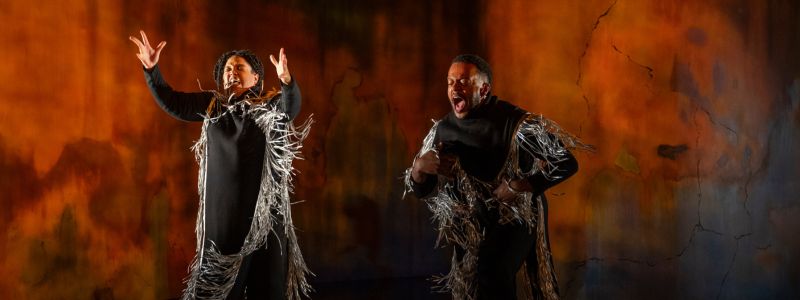Post-Show Discussion Activity

After viewing Antigone, reflect on the production with companions, classmates, or by yourself.
If engaging in this activity independently, consider taking notes or writing your reflections down. If engaging in this activity with a class or group, decide if you would like to answer every question in order, skip around, or select certain questions to focus on.
Discussion Questions
- How does this production of Antigone play with both public and private moments?
- How do the set and costumes embody, challenge, and/or reflect the play’s characters?
- The first two plays in the Oedipus Trilogy center around dramatic prophecies and predictions early on. In this play, the supernatural signs from the gods come into focus only in response to Creon’s decisions. Who is in charge in the world of Antigone – Fate or the State?
- At the end of the play, nearly everyone in Antigone’s family tree is dead, except her sister, Ismene, and her uncle, Creon. After everything that has taken place, what is left? After the world has been destroyed, what remains when the dust settles?
- What right do the dead have to dignity? How do the living affirm or deny their own humanity through burial rituals?
- What are the characters in Antigone willing to die for? What are they willing to live for?
- How does this play reflect, reify, or challenge the politics we know?
- In what ways does love filter through carnage in this story?
- Antigone says, “I joined the dead and I will help them.” She is also referred to at the end of the play as the “bride of the dead.” Creon is called a “corpse that breathes.” When Creon refuses again to bury Polyneices, Tiresias asks, “Why kill the dead a second time?” Where is the line between life and death in this play?
- This activity aligns with the following standards:
- Illinois Arts Learning Standards
- Anchor Standard 7: Perceive and analyze artistic work.
- Anchor Standard 8: Construct meaningful interpretations of artistic work.
- Anchor Standard 11: Relate artistic ideas and works with societal, cultural, and historical context to deepen understanding.
- Common Core State Standards
- CCSS.ELA.SL.1 Prepare for and participate effectively in a range of conversations and collaborations with diverse partners, building on others’ ideas and expressing their own clearly and persuasively.
- CCSS.ELA.R.3 Analyze how and why individuals, events, and ideas develop and interact over the course of a text.
- Illinois Arts Learning Standards